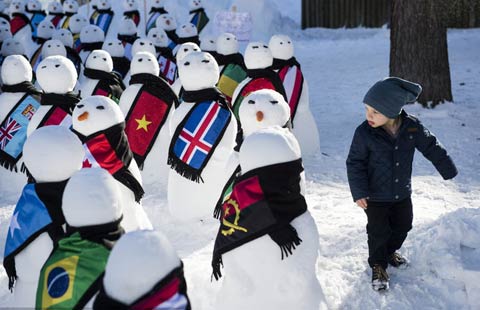Rock-Paper-Scissors: Paper wins
Updated: 2015-01-27 11:36
By Lian Zi in San Francisco(China Daily USA)
|
||||||||
The schoolyard game of Rock-Paper-Scissors doesn't seem like one in which players take a scientific approach.
But that is exactly what three Chinese scientists discovered, and their findings were published in a research paper that won them a Best of 2014 by MIT Technology Review, published at the prestigious Massachusetts Institute of Technology in Cambridge.
Wang Zhijian and Xu Bin of the Experimental Social Science Laboratory at Zhejiang University, and Zhou Haijun of the Institute of Theoretical Physics of the Chinese Academy of Science wrote a paper called Social Cycling and Conditional Responses in the Rock-Paper-Scissors Game.
"It is the first time Chinese scientists won this prize in the social science realm," according to a statement by Zhejiang University in Hangzhou.
Their research revealed a pattern of choices players make during the game.
Players randomly choose each action about a third of the time in the first round. However, in later rounds, players who win tend to stick with the same action, while those who lose always switch to the next action in a clockwise direction going from rock to paper, paper to scissors, or scissors to rock. The pattern is also summarized as "win-stay, lose-shift" in the paper.
To win, players need to pay attention to what their opponent just did. Then they can estimate how their opponents will act next, and throw the hand to beat the move.
If a player wins by playing rock, he is very likely to play rock again in the next round. But if he loses, he will most likely switch to paper in the next round.
This is known in game theory as a conditional response and has never been discovered before in game experiments, according to MIT Technology Review.
"This game exhibits collective cyclic motions, which cannot be understood by the Nash Equilibrium concept (which postulates that players randomly complete their actions to avoid being exploited), but are successfully explained by the empirical data-inspired conditional response mechanism," according to Wang.
To find the pattern, researchers recruited 360 students at Zhejiang University for the experiment. Participants were divided into 60 groups of six players. Students in each group played 300 rounds against each other, and their actions were recorded.
The theory was also selected in the Science News Highlights of 2014 by BBC News on Dec 24. The paper also has been published by Scientific Reports, an online open-access scientific journal, according to Zhejiang University.
zilian@chinadailyusa.com

 Northeastern US braces for 'crippling' blizzard
Northeastern US braces for 'crippling' blizzard
 At least 2 dead, dozens hurt after bus hits road barrier
At least 2 dead, dozens hurt after bus hits road barrier
 Red carpet of 21st annual SAG Awards in Los Angeles
Red carpet of 21st annual SAG Awards in Los Angeles
 New Year celebrated with dance mix
New Year celebrated with dance mix
 Businesswomen shine at the World Economic Forum
Businesswomen shine at the World Economic Forum
 Dogs compete at the Siberean Cup
Dogs compete at the Siberean Cup
 The world in photos: Jan 19-25
The world in photos: Jan 19-25
 Drama with a twist
Drama with a twist
Most Viewed
Editor's Picks

|

|

|

|

|

|
Today's Top News
Rock-Paper-Scissors: Paper wins
10 million new jobs on way in China, Li vows
Obama's trip to India spurs triangle chatter
Chinese plan NJ's tallest building
Motorola to make phones in Tianjin
High abortion rate triggers fears for young women
Small drone crashes on White House
Clients urged to be wary as deposits vanish
US Weekly

|

|







